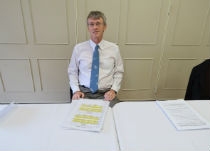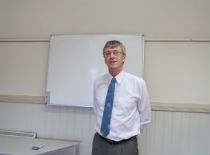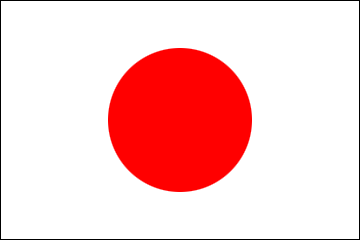Dr Wayne Lawrence, Senior Lecturer in Japanese at the University of Auckland
2017/5/17


Dr Wayne Lawrence, Senior Lecturer in Japanese at the School of Cultures, Languages and Linguistics at the University of Auckland, first became interested in the Japanese language when he heard New Zealand Broadcasting Corporation's radio programme "Let's speak Japanese" (a rebroadcast of a Radio Japan programme) as a primary school student. In high school he strengthened ties with visiting students from Japan and he went to Japan for the first time in 1977 as a Japanese government scholarship student at Tokyo University of Foreign Studies. He studied Japanese language at Tokyo University of Foreign Studies and specialised in phonology for his master’s degree, after which he studied linguistics for his PhD at Tsukuba University graduate school, extending his initial 5 year scholarship term every year for a total of 10 years. After completing the doctoral course he returned to NZ in 1987 and became a lecturer at the University of Auckland. Since then, he has continued his research into Japanese language education and linguistics, from the latter half of the 1980 when interest in the Japanese language was booming in New Zealand, until now.
Dr Lawrence has been involved in Japanese language education for more than 30 years in New Zealand as a lecturer at the University of Auckland. Regarding the number of learners of Japanese at the university, he says that at the peak of popularity there were 500 applicants for 200 places. However, in recent years the number of students has declined and there are now fewer than 200. Recently many of the Japanese learners are Asian students, and there is a sense of crisis about the number of students who select Japanese language studies.
Dr Lawrence’s specialty is research on Japanese accents and his Okinawa dialect research received the Okinawa Cultural Association's "Kinjo Choei Prize" in 2008. Kinjo Choei (1902 - 1955) was an authority on Okinawa dialect research. A book that Dr Lawrence picked up by chance at a secondhand bookstore in Tokyo’s Kanda district during his studies was related to the dialect of the Okinawa district, and as a result he became absorbed in the study of Okinawan dialects. In addition to Okinawa, Dr Lawrence has studied dialects of various places in Japan, and he says that in dialect studies it is impossible to judge only by what is written on the page, it is necessary to directly interview speakers who actually speak the dialect. He has visited various regions of Japan so far and listened to dialects that are actually being spoken. In particular he finds it fun to analyse and verify from various viewpoints how pronunciation and accent change depending on the connection of words and discover the rules that govern this, not only in Japanese but also other languages.
Dr Lawrence says that Japan is very attractive with a diversity of food and customs from region to region. He also loves languages and tries to travel to areas where he does not have much familiarity with the language. He plans to continue his research on Japanese in the future even after he retires from university.
Dr Lawrence has been involved in Japanese language education for more than 30 years in New Zealand as a lecturer at the University of Auckland. Regarding the number of learners of Japanese at the university, he says that at the peak of popularity there were 500 applicants for 200 places. However, in recent years the number of students has declined and there are now fewer than 200. Recently many of the Japanese learners are Asian students, and there is a sense of crisis about the number of students who select Japanese language studies.
Dr Lawrence’s specialty is research on Japanese accents and his Okinawa dialect research received the Okinawa Cultural Association's "Kinjo Choei Prize" in 2008. Kinjo Choei (1902 - 1955) was an authority on Okinawa dialect research. A book that Dr Lawrence picked up by chance at a secondhand bookstore in Tokyo’s Kanda district during his studies was related to the dialect of the Okinawa district, and as a result he became absorbed in the study of Okinawan dialects. In addition to Okinawa, Dr Lawrence has studied dialects of various places in Japan, and he says that in dialect studies it is impossible to judge only by what is written on the page, it is necessary to directly interview speakers who actually speak the dialect. He has visited various regions of Japan so far and listened to dialects that are actually being spoken. In particular he finds it fun to analyse and verify from various viewpoints how pronunciation and accent change depending on the connection of words and discover the rules that govern this, not only in Japanese but also other languages.
Dr Lawrence says that Japan is very attractive with a diversity of food and customs from region to region. He also loves languages and tries to travel to areas where he does not have much familiarity with the language. He plans to continue his research on Japanese in the future even after he retires from university.
